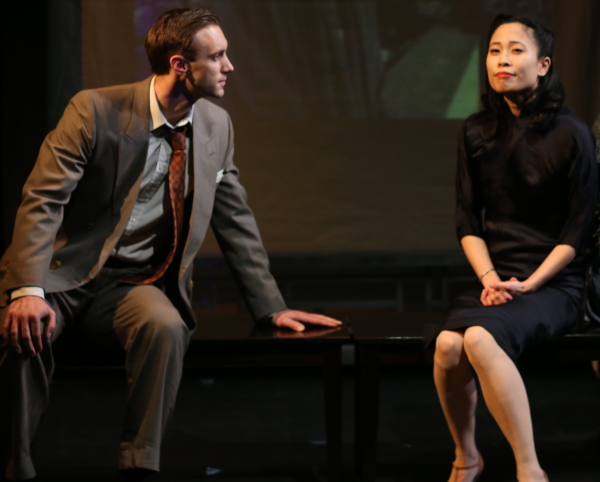
(© John Quincy Lee)
As a genre, film noir carved out a special place for itself in the history of cinema. Sinister plots and shadowy scenes blend together with ill-fated love affairs between hardboiled detectives and femmes fatales in a dismal, morally corrupt world. Pan Asian Repertory Theatre has brought those elements to the stage of the Beckett Theatre at Theatre Row with Damon Chua's Film Chinois, with mixed results. Though Chua and director Kaipa Schwab seem to have a deep knowledge of the genre, the effects that make film noirs so fascinating on-screen do not always translate to the stage.
In 1947 China, the Maoist revolutionary Chinadoll (Roseanne Ma) is tasked with a secret mission. At a smoky cafe in Beijing, she meets an American operative, Randolph (Benjamin Jones), whose assignment, which involves a pair of "Twins," overlaps with hers, and he just might complicate Chinadoll's plans. At the heart of the intrigue is a film that contains some sensitive information about the Belgian Ambassador (Jean Brassard), who has a casual sexual relationship with the capitalist-minded lounge singer and informant Simone (Katie Lee Hill). Randolph falls for Chinadoll hook, line, and sinker, but Chinadoll knows a love like theirs can never be. And when a mysterious man (James Henry Doan) enters and complicates matters, the plot thickens until the secret identity of "The Twins" and the content of the film are revealed.
Any fan of film noir will immediately recognize some of the genre's distinctive traits. Ma serves as the narrator as she relates Chinadoll's thoughts and curious motives while the action unfolds. She gives a stern, sometimes overly rigid performance, making us wish that she simmered more with the conflicted love and longing of a sultry-eyed, gravelly voiced Bacall. Carol A. Pelletier's period costumes, especially the women's gowns, add a touch of long-lost elegance to the seedy scenes, and Sheryl Liu's set, with its Chinese motifs and red paper lantern, is enhanced by Ian Wehrle's sound design, which helps create the backdrop of a rainy, tempestuous Beijing. The set remains sufficiently shadowy with Marie Yokoyama's lighting design, though at times spotlights break the gloomy mood when they glare a bit too garishly on the actors.
A twisted, convoluted plot is a common convention of film noir, and Chua has certainly given Film Chinois one of those. By the end, the audience may not be exactly sure what has happened. But actors Jones, Hill, and Brassard give a good show while playing up some of the script's melodrama and unexpected turns. Brassard and Hill manage to create a comical chemistry onstage that's fun to watch, as do Jones and Ma, especially in their deliciously stagy exchanges, like the one in which Randolph and Chinadoll meet and slow-dance at a party — Randolph: "I'm married. But I'm leaving her…" Chinadoll: "I don't love you." Randolph: "Good. I don't love you too." It doesn't get much hammier than that.
In moments like these, Film Chinois hits noir right on the nose and creates a real sense of the cinematic. Unfortunately, those moments are few and far between, and in the end, when the mysteries of the film and the Twins are revealed, the stakes seem much lower than we were led to believe. It's challenging to bring the stylings of a film-based genre to the stage. Film Chinois at times does come close to re-creating the gritty world of noir, but fans of The Big Sleep might have to stifle a yawn now and then.







